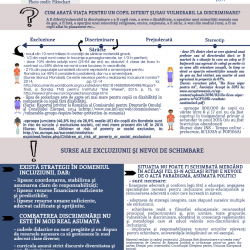A Parent's Experience in the Romanian Educational System
Hello, dear people!
I am the mother of an 11-year-old student and I thank Heaven for this. I feel the need to share with you a couple of thoughts regarding our “encounter” with the school.
Our child had the great opportunity of attending an Anglo-Italian Montessori school in Italy for 3 years. It was an insightful experience for the child, as well as for us as parents. We were to discover an educational strategy that we did not believe we would be able to try out. We were deeply marked by the style and approach chosen to attract children into learning. It’s wonderful, as a mother, to have that feeling of fulfilled peace, knowing that your baby is happily willing to go to school every day. In those three years, all of us (, the child, my husband and I) were an active part in all the activities of a student’s life. Through the nature of the school activities, the parents’ implication was inevitable; thus, the child-teacher-parent relationship was a strong and beneficial one.
Everything went on with an innate cheerfulness.
The only thing that overshadowed our optimism from time to time was the thought that we were going to return to the education system in Romania (we were away on a NATO mission with my husband). And yet I did not want to be pessimistic, I tried to encourage myself with the hope that something had changed in the approach of the Romanian education in the past few years or better said, I was consoling myself. I had had the experience of the first grade in Romania and I cannot say that I was left with a sweet taste. The countless hours spent by my son’s side encouraging him to fill out papers, auxiliaries and other mandatory homework, in no case optional, made me appreciate what I had discovered in the school from Italy even more. I do not want to remember that ABC, which was sealed with the essence of gender stereotypes and had no approach regarding tolerance for vulnerable groups. After graduating from the first grade, I felt that a “burden” was lifted from my child’s shoulders, despite the fact that he graduated with success, having obtained maximum results, filled with diplomas and medals from various contests that he attended (Romanian and mathematics).
In the three years of school abroad, he managed to fill himself with positivism from all points of view: he learned to appreciate himself, to see school as a second family, to respect and to admire his teachers, even getting to a point of loving them as if they were part of our family, he discovered the team spirit in which tolerance for any colleague was the letter of the law, no matter their skin color (race), religion language or social status, and many other “advantages” of daily life.
Therefore, I felt a void in my stomach when September 2017 arrived and he began the fifth grade here, in the country. (I don’t want to tell you how many bureaucratic and administrative barriers we had to overcome until we managed to enroll him in school…).
Fortunately, my child adapted quicker than I expected (because I have heard opinions from other parents in our situation, who had struggled), he managed to find a place for himself in the class team and begin a new stage of his student life. I have to admit that the encounter with the first “infinite” homework and the stiffness of the student-teacher relationship scared him at first and I felt that he was suffering and that he missed the school in Italy. But, step by step, he managed to get in synch with the requested rhythm and, after the first semester, I can say that everything that he had learned in the foreign education system helped him enormously in his progress and eased his integration into any new group, although at first he was subjected to labels from some of the teachers and students, who underestimated him because he came from an international school, where education was certainly “too soft” and he will fail to keep up with the “hard and real” school in Romania ( or so they claimed). This proved to be completely false, the child having a 9.62 average in the first semester. I find the fact that these prejudices are promoted and perpetuated, even by teachers, to be inadmissible, but we live in a society in which stereotypes, resentment and negative conservatism have an “honorable” place.
Maybe I am looking at all of these things through the eyes of a “Policies, gender and minorities” graduate. But even without having specialized studies, I would have identified a difference between the two schools’ “feelings”. The involvement of all decision-making forums is needed for a correct approach and implementation of education in school. Everything must be related to the context in which we live in; we can’t let education, with all that it involves, anchored in a past era, and outdated by nature and by way of elaboration. Let’s try to look beyond the strict rules that must be applied only because some were educated to think so. Our children need a different view, a view that educates them as people for the present and the future, not for the past times in which we or our ancestors grew up.
I finish this letter with the optimistic thought that people such as you will manage to make their voices heard among those who prepare education strategies and school curricula.
Have a nice day!
Anghel Monica













